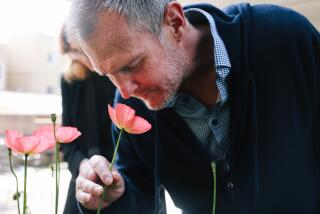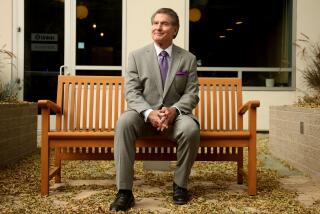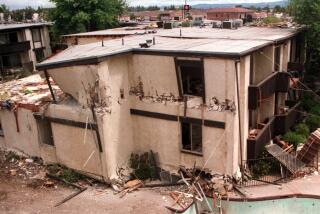A troubled vet and the dad who witnessed the turmoil
When I arrive at the Hollywood recovery house where Greg Valentini lives with a few dozen other bomb-rattled veterans of the wars in Iraq and Afghanistan, he hops in the car. He’s been looking forward to this.
In our conversations over the last few months, Greg has always talked fondly of his dad, the man who stuck with him through some ugly times, and I’ve wanted to meet him. So we are heading to Lakewood, where Greg, now 33, grew up and where, after tough tours in two wars, he screwed up and landed in jail.
As we pass the suburban tracts and industrial warehouses near Long Beach Airport, Greg peers out the car window into a world that’s both comforting and dangerous for a guy in recovery. He knows where to score meth in a minute, and he could go on a run right now, hustle some money, strike a match and go blissfully numb.
We pass the cemetery where his grandparents are buried and come upon a city of Lakewood sign with this call to order: “Times change, values don’t.” It’s a neat bit of suburban Americana. Lakewood grows good people.
Greg has been telling me that his father, Carl, who runs his own refrigeration business with an 85-year-old woman named Nellie answering the phones, is a good man. And Greg, to his eternal regret, did him wrong.
After his Army tours in Afghanistan and Iraq, Greg stole from his father and his father’s girlfriend to support his habit. He has told me he sometimes thinks it would have been better to die in Afghanistan and get buried honorably, with a flag draped over his coffin, than come home and sink into addiction, grubbing around as a homeless vet, making pilgrimages to the cemetery to confess his sins to his grandparents, all the while hoping his dad wouldn’t see him so low.
They hug when they meet on the front lawn of the 1,100-square-foot, home, which was built in 1955, when Lakewood was ripping along with aerospace and industrial jobs filled by WWII vets. Carl Valentini, a Vietnam-era vet, flies the flag out front and another one out back, high enough to see from a mile away.
On the back porch, Greg and his father settle quickly into their groove, talking Lakers and Clippers and neighborhood stuff, more like buddies than father and son. It’s been three months since they’ve been together, and they’re clearly happy to see each other. Greg is nine months into recovery. Except for two brief lapses on weekend passes, he’s been clean that whole time. When he’s not in therapy for post-traumatic stress disorder or addiction, he’s at L.A. City College, starting the long haul toward a degree in social work. He wants to one day counsel guys like him on how not to become guys like him.
Mr. Valentini works the grill, barbecuing burgers for a picnic, and he serves up a gourmet salad picked fresh out of the garden he tends.
“He didn’t give me any problems growing up,” says Mr. Valentini. Greg and his younger brother were raised primarily by their dad after their parents divorced. Greg was 11 at the time, and today, all he cares to say about the upheaval is that he’s dealt with it.
The troubles began, Mr. Valentini says, when Greg went off to war and came home someone else.
“He slept all day, and he was just depressed,” Carl Valentini says.
Greg says he couldn’t find work in the town that was built for veterans and celebrates “values” that never change. He resented people’s detachment from the wars their country is fighting. Still does. He says his anger rises when it seems that nobody cares that, on average, 18 veterans commit suicide every day in the United States.
As the father grills burgers on a sunny and pleasant Southern California day, the son takes us into a war zone on the other side of the world. In Afghanistan, Greg says, his whole unit smoked opium “to take the edge off.” Surviving firefights seemed to be a matter of luck. Once, in a convoy, he was switched out of one vehicle and into another. Minutes later, the first vehicle hit an IED, and there were no survivors.
Back home, it was meth that took the edge off, and nearly destroyed him.
“It wasn’t pretty,” says Mr. Valentini.
His son was scatterbrained, dishonest and jumpy. Mr. Valentini was torn. He knew Greg was strung out, but he also knew he’d been through something horrible.
“I was probably too lenient, but I was trying to understand his side of it.”
“But I got worse and worse,” admits Greg, who stole cash, credit cards and jewelry from his father. “I did a lot of humiliating things.”
“Yeah, it was a blow,” says Mr. Valentini.
Greg, who was arrested several times, often limped back home when he was set free. Once, his father told him he could sleep on the back porch, that was it. Another time, he kicked him out altogether.
But when Greg got into a homeless vets recovery program in Long Beach, Mr. Valentini attended family therapy sessions with him.
“Because I loved my son,” he says. “I just kept praying for him.” And that hasn’t stopped.
Mr. Valentini says his son is much better now, and stronger. He’s pulling for him to make it this time.
The one-year Hollywood program was offered to Greg in lieu of jail. In August, he’d like to try living on his own somewhere in Hollywood, a safe distance from his worst habits. But close enough to visit his dad regularly.
When we leave the house in Lakewood, Carl and Greg Valentini hug each other.
“I love you, Greg,” says the father.
“I love you too,” says the son.
More to Read
Start your day right
Sign up for Essential California for news, features and recommendations from the L.A. Times and beyond in your inbox six days a week.
You may occasionally receive promotional content from the Los Angeles Times.







